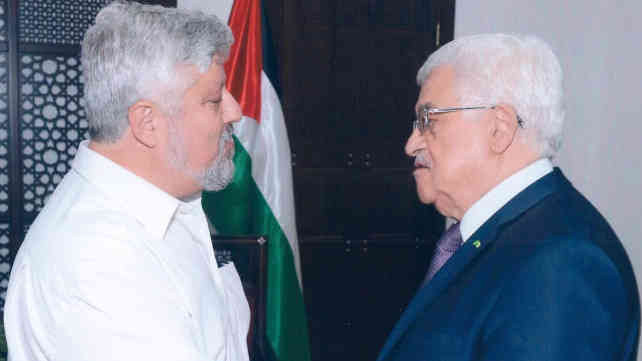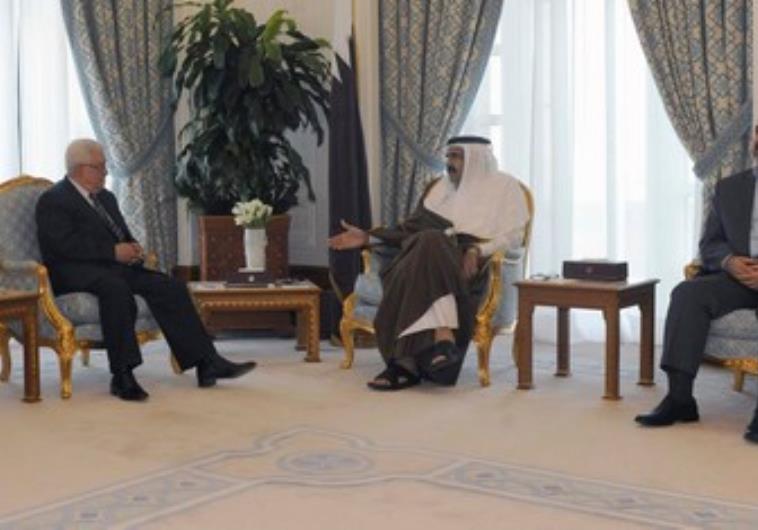Several weeks ago I wrote that the war in Gaza „may have really been a war of no choice.“ Following the recent leaks from the talks about the „imminent“ release of Gilad Schalit, I have decided to expose what I already knew before the war began.
Two weeks before Israel launched its attack on Gaza in response to a breakdown of the tahadiyeh (the cease-fire) with three weeks of barrages of Kassam rockets and mortar shells against its civilian popula- tion, I had met with a senior Hamas personality in a European capital. This person is connected and in contact with the Hamas leadership in Gaza and in Damascus. Over the past 950 days since the abduction of Schalit, he has transmitted messages for me back and forth to the Hamas leadership in Damascus, including a letter from Noam Schalit to Khaled Mashaal on September 8, 2006 that led to the release of the first sign of life from Gilad, which was received by the Egyptians on September 9, 2006.
We spent several hours talking about the conditions to renew the tahadiyeh. Since the abduction of Schalit on June 25, 2006, my involvement behind the scenes has been in holding unofficial talks with vari- ous Hamas leaders in Gaza, Damascus and elsewhere, all seeking to advance the negotiations to bring Gilad home. For two and half years I have been trying to bring about a direct secret back-channel bypass- ing third party mediators in order to speed up the process.
INITIALLY WHEN Hamas proposed such a channel, about one month after the abduction, Prime Minister Ehud Olmert rejected it with a knee-jerk response that “we don’t negotiate with terrorists.” About a year later, I received permission from the government to see if it was possible to open up the direct secret back channel. Until two weeks before the Gaza war, Hamas refused.
My talks with the Hamas leader in Europe focused on two main issues: convening a secret direct back channel and linking the prisoner exchange for Schalit’s release to the renewal of the cease-fire and the ending of the economic siege on Gaza. For about two years Hamas has rejected the linking of the pris- oner exchange with the cease-fire and the end of the siege. Since, however, this was the initial position of Hamas immediately following the abduction of Schalit, as was communicated to me some three weeks after the abduction – a call for a cease-fire, opening the borders and the prisoner exchange – I appealed to the Hamas leader to go back to the original demands, but to include an agreement to bypass the Egyptian mediators through a direct secret back channel.
Our talks led to his agreement to get the approval of the Hamas leadership for this proposal. We con- cluded our talks with a note handwritten by him on the new proposed framework. We agreed that I would approach the Israeli leadership, and he would get the approval of the Hamas leadership. We further agreed that both of us would be directly involved in the talks along with others who would be appointed by the leaders on both sides.
I returned to Israel and 10 days before the war broke out I wrote to Olmert, Defense Minister Ehud Barak and Foreign Minister Tzipi Livnithat Hamas was willing to open a direct secret back channel for a package deal that would include the renewal of the cease-fire, the ending of the economic siege and the prisoner exchange for the release of Schalit. I further indicated that Hamas would be willing to implement the
agreement on Rafah which included the stationing of Palestinian Authority personnel loyal to President Mahmoud Abbas in Rafah and a return of the European monitors. I communicated the same message to Noam Schalit and asked him to make sure that Ofer Dekel, who is charged with the Schalit file by the government, received the Hamas “offer.”
I waited for a response from one of the people who received my letter.
Nothing. No response. When the war broke out I understood that the decision to go to war had already been taken and that the government preferred to teach Hamas a lesson rather than negotiate a new cease-fire and the release of Schalit. I understood that the leaders believed that they could bring about a regime change in Gaza, even if this was not the stated goal of the war. Why would we negotiate with Ha- mas if we expected to bring about the fall of Hamas?
OVER THE PAST DAYS the media has been filled with reports that there is a new breakthrough in the talks for the release of Schalit: “Hamas is willing to link the end of the economic siege with the release of Schalit.” When I read this I said to myself – enough lies and spins.
What did this war achieve? What has changed? Has Israel gained its military deterrence? Has Israel changed the security reality in the South? Is Gilad Schalit at home? Has Hamas reduced its basic de- mands for the release of Schalit? No, no and no! Israel is negotiating now for exactly what could have been achieved without going to war. Israel spent $1 billion on the war, caused some $2 billion worth of damage in Gaza, more than 1000 people have been killed, thousands of lives have been destroyed. Hun- dreds of thousands of Israelis lived through weeks of terror; millions of Palestinians suffered the bom- bardment of their towns, cities and refugee camps – what is the result? More hatred, more extremism and more support for fanatics and their ideas – on both sides of the Gaza border.
If the transition government of Olmert does bring Schalit home before the new government is formed, it will pay the exact price that it could have paid nearly 950 days ago. The price then was as unreasonable as it is today; the problem is that there is simply no other way of bringing Gilad home. Hamas has not changed its price. The war in Gaza did not create any positive developments. It has not changed the price. It has not enabled a new breakthrough. It has weakened the moderate leadership of Abbas. It has weak- ened the moderates in Gaza. It did not achieve the goals that our leaders hoped it would.
The war was supported by 94 percent of Israelis because they really believed it was a “war of no choice.” Lies, lies and lies. There was a choice. That choice was made – our leaders preferred war regardless of the cost. We don’t negotiate with terrorists. We won’t talk with Hamas. They don’t recognize our right to exist, and we don’t recognize that they were elected in democratic elections. Instead we hit them first and then we talk. We planned the war rather than planning how to avoid the war. That is the doctrine of the government. Now we can talk with Hamas? Isn’t that what the government is doing today?
Perhaps the talks are not direct, but we are negotiating with Hamas.
The agreement that will be reached will be exactly what I proposed to Olmert, Barak and Livni 10 days before the war began.
Photo: Ahmed Jabari, Mahmoud al-Zahar and Raad Saad


